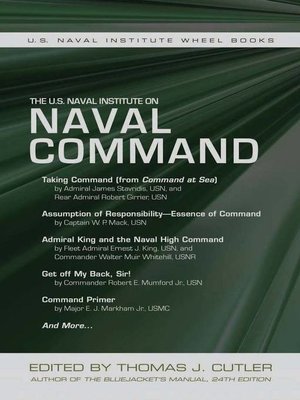The U.S. Naval Institute on Naval Command
ebook ∣ U.S. Naval Institute Wheel Books
By Thomas J Cutler

Sign up to save your library
With an OverDrive account, you can save your favorite libraries for at-a-glance information about availability. Find out more about OverDrive accounts.
Find this title in Libby, the library reading app by OverDrive.



Search for a digital library with this title
Title found at these libraries:
| Loading... |
In the U.S. Navy, "Wheel Books" were once found in the uniform pockets of every junior and many senior petty officers. Each small notebook was unique to the Sailor carrying it, but all had in common a collection of data and wisdom that the individual deemed useful in the effective execution of his or her duties. Often used as a substitute for experience among neophytes and as a portable library of reference information for more experienced personnel, those weathered pages contained everything from the time of the next tide, to leadership hints from a respected chief petty officer, to the color coding of the phone-and-distance line used in underway replenishments. In that same tradition, the new Naval Institute Wheel Books will provide supplemental information, pragmatic advice, and cogent analysis on topics important to all naval professionals. Drawn from the U.S. Naval Institute's vast archives, the series will combine articles from the Institute's flagship publication Proceedings, selections from the oral history collection and from Naval Institute Press books to create unique guides on a wide array of fundamental professional subjects. Command is the pinnacle of leadership in a military organization. Navy regulations define both the authority and the responsibility of command as "absolute." This Naval Institute Wheel Book provides practical guidance and advice that actual and would-be commanders can use to carry out that absolute authority. Included in this carefully selected collection is the experience of those who have commanded as well as the expectations of those who are commanded. Aspirants as well as practitioners will do well to exploit this selected survey of what Fleet Adm. Chester Nimitz described as the "one purpose" for entering the Navy.






